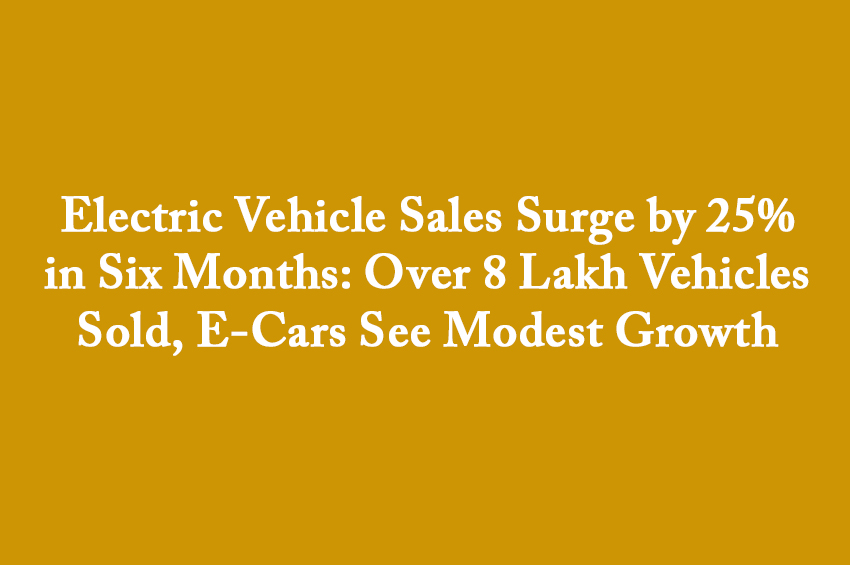Winning Bizness Desk
Mumbai. The electric vehicle (EV) market in India has seen significant growth in recent months, with total sales increasing by 25% year-on-year in September 2024. According to data from the Vahan portal, total EV registrations for the month reached 1.49 lakh units, a rise from 1.19 lakh in September of the previous year. In the first half of the current financial year (April to September), a total of 8.37 lakh EVs were registered, reflecting a 19% increase compared to 7.02 lakh vehicles registered during the same period last year.
Slow Growth in Electric Passenger Vehicles
However, while the overall EV market has grown considerably, the electric passenger vehicle segment (which includes cars and SUVs) has experienced relatively modest growth. Sales of e-passenger vehicles stood at 43,120 units during the first half of this financial year, a slight increase from 42,550 units in the same period last year. In the first quarter (April to June), sales grew by 8.6%, with 22,749 units sold, but the second quarter saw a 6% decline, with sales dipping to 20,141 units.
Electric Two-Wheeler Market Shows Strong Performance
The electric two-wheeler segment, on the other hand, has performed exceptionally well. In September 2024, a total of 88,000 electric two-wheelers were sold, a substantial 40% increase compared to the 63,000 units sold in September 2023. Ola Electric, a leading player in the sector, sold 23,965 units in September, though this was a slight decrease from 26,928 units in August 2024. Bajaj, another major manufacturer, saw its sales increase from 16,650 units in August to 18,933 units in September, overtaking TVS Motor to claim the second spot in the electric two-wheeler market.
Growth in Electric Three-Wheeler Sales
The electric three-wheeler segment also saw steady growth. In September, 54,000 electric three-wheelers were registered, up from 49,000 units in the same month last year. This marks a 10% year-on-year increase, with sales also surpassing the 52,000 units registered in August 2024.
Rising Power Consumption at Charging Stations
One of the key indicators of the growing adoption of electric vehicles is the sharp rise in power consumption at public charging stations across the country. In the first quarter of the current financial year, power consumption at these stations more than doubled, rising by 108% compared to the previous year. A total of 17.69 crore units of energy were consumed during this period. India's EV fleet has also expanded rapidly. In 2023-24, the country had 16.82 lakh electric vehicles, and this number surged to 45.75 lakh by July 2024. Projections estimate that India could have as many as 5 crore EVs by 2030, creating a market worth ₹4 lakh crore.
The Need for More Charging Infrastructure
With the rapid increase in EV adoption, there is a pressing need to expand the country's charging infrastructure. As of March 2024, India had 16,347 public charging stations, up from 1,800 in February 2022. However, to meet the growing demand, India will need to install around 4 lakh charging stations annually to achieve a ratio of one station per 40 electric vehicles.
Conventional Automakers See Mixed Results
Meanwhile, conventional automakers continue to see varied results in the Indian market. Maruti, the country's largest car manufacturer, saw a 2% increase in its total sales (domestic and export) in September 2024. The company recorded wholesale sales of 1.84 lakh vehicles, with exports totaling 27,728 cars, up by 23% from September 2023.
Hyundai also reported strong performance in its SUV segment, with 70% of its total sales coming from SUVs. This marks its highest-ever sales for SUVs in a single month. Kia Motors, another major player, sold 5,351 units of its popular Sonet SUV in September, reflecting a 44% year-on-year increase. Notably, India’s electric vehicle market is experiencing rapid growth, especially in the two-wheeler and three-wheeler segments. However, the slow growth in electric passenger vehicle sales highlights the challenges that remain in the broader adoption of EVs. As the country continues to expand its charging infrastructure and address consumer concerns, the EV market is poised to become a critical component of India’s transportation future.


